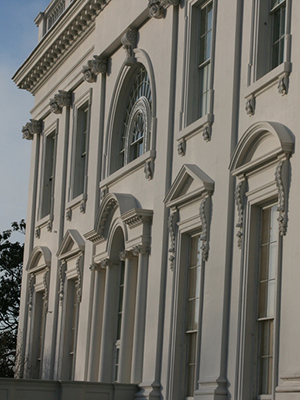The election of Donald Trump as the next president of the United States has come as a shock to America’s bipartisan establishment. Trump is clearly unqualified for the highest office in the land. He is not related to any former president, either by blood or marriage — and yet he won anyway.
How could this happen?
It wasn’t supposed to be like this. In 2015, before Republican and Democratic primary voting had even started, the elites of the two parties had already chosen the candidates who would face each other in the 2016 presidential election. The anointed presidential candidate of the Republican Party was going to be Jeb Bush, the son of one recent president and the brother of another. The anointed presidential candidate of the Democratic Party was to be Hillary Clinton, the wife of another recent president.
That was the plan. The battle for the White House in 2016 would be a contest of the House of Bush and the House of Clinton.
Both American royal dynasties and their retainers were well-known to America’s political donor class, as well as to the hordes of appointees looking for patronage jobs in the next administration. There would be no surprises if a scion of either house were elected. To be sure, during the primary season, Jeb would pretend to be an ideological conservative and Hillary would play up progressive themes. But, once elected, either Bush or Clinton would forget campaign promises and carry out the donor-class agenda: more pro-corporate transnational regulatory harmonization agreements (“trade agreements”), more legal immigration plus toleration of mass illegal immigration, and “entitlement reform,” defined as cutting the Social Security and Medicaid benefits of middle-class retirees, rather than raising taxes on the rich.
But the billionaire donors and the job-hungry would-be appointees should have known the plan could go wrong. After all, it had gone wrong in 2008, when a little-known Illinois Senator, Barack Obama, had seemingly come out of nowhere and prevented Hillary Clinton from gaining the Democratic presidential nomination. Obama went on to be re-elected in 2012, keeping Bushes or Clintons out of the White House for eight years.
The success of the interloper Obama should have served as a warning to the establishment. Still, there was reason to hope that the alternation of the White House between the House of Bush and the House of Clinton would resume in 2016. None foresaw that a brutal usurper would topple both presidential dynasties and win the White House for himself: Donald Trump.
Jeb Bush was the first to fall, bullied out of the Republican primaries by the trash-talking real estate developer and reality TV star. When Trump, against all expectations, won the nomination of the Republican party for the presidency, the Republican establishment was appalled — and most Democrats were jubilant. Hillary Clinton would easily vanquish the populist billionaire in the general election.
Instead, Election Night 2016 turned into the political version of “The Red Wedding” in George R. R. Martin’s Game of Thrones. When the electoral massacre had ended, Donald Trump was president-elect of the United States, having decimated both the House of Bush and the House of Clinton.
The seizure of the White House by outsiders, first Barack Obama and now Donald Trump, suggests that the dynastic politics favored by elites of both parties will have to be reconsidered.
Having the White House alternate between two wealthy, familiar political families may reassure corporate lobbies, Wall Street banks, and billionaire donors, but it turns out that this modified version of hereditary monarchy has very little appeal among American voters.
The voters, we have learned, have a different conception of democracy than the donor class. Ordinary Americans think of elections not as chances to passively ratify the candidates already chosen by party elites, but as opportunities to choose the candidates they prefer. Where this populist idea of genuine voter power came from is not clear, but it now seems to be widespread.
But all may not be lost. Particular dynasties may topple, while the system of dynastic politics may survive in the United States, as new dynasties replace the old.
There is already talk, for example, of First Lady Michelle Obama running for president in 2020, to bring about a restoration of the House of Obama.
And many have been impressed by Donald Trump’s daughter Ivanka and son Eric, speculating about future political careers for them as well.
Will the game of thrones, pitting the House of Bush and the House of Clinton, give way to a new cycle of struggles between the House of Obama and the House of Orange? Or — as inconceivable as it seems — will American voters persistently and perversely insist on choosing candidates from beyond a small circle of well-connected political dynasties endorsed by risk-averse major economic interests? Only time will tell. •
Images courtesy of alvesfamily via Flickr (Creative Commons)




